Greetings! I hope and trust that this finds you well and enjoying life.
To further our discussion about investing basics and your retirement this week let’s examine cash and cash alternatives. In daily life cash is all around you, as currency, bank balances, negotiable money orders, and checks. However in investing, “cash” is also used to refer to so-called cash alternatives, investments that are considered relatively low-risk and can generally be converted to cash quickly. Money market mutual funds and guaranteed investment contracts (GICs), government savings bonds, U.S. Treasury bills, and commercial paper are some examples of cash alternatives.
Because of their conservative nature, cash alternatives involve the least risk. However, there is a tradeoff for their relative safety, their potential return is not as high as the return on investments that involve more risk. By focusing solely on playing it safe, you may limit your investment income, especially over longer time periods.
Cash alternatives can be useful in many ways. First, they can provide relative stability. While cash alternatives can’t assure you of a gain or protect you from losses, they are generally considered safer than other asset classes, such as stocks or bonds. Also, they can provide income on cash that would otherwise be idle. Readily available cash also can help you cope in a financial emergency. Finally, cash alternatives can serve as a temporary parking place when you’re not sure where to invest.
If you have questions about the above or any questions related to your retirement planning don’t hesitate to call.
Best regards,
Jeff Christian CFP, CRPC
Knowing is not enough; we must apply. Willing is not enough; we must do.
Johann Wolfgang von Goethe

